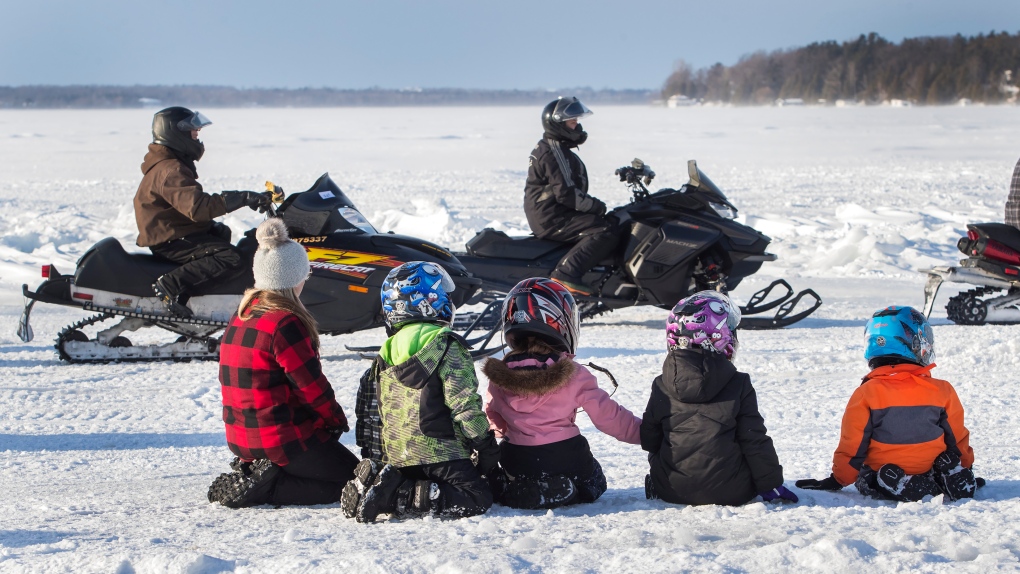Snowmobiling in Ontario becoming riskier due to climate change: OPP
 Children watch family day weekend snowmobile radar runs on Sturgeon Lake in the city of Kawartha Lakes, Ont., Sunday, Feb. 20, 2022. THE CANADIAN PRESS/Fred Thornhill
Children watch family day weekend snowmobile radar runs on Sturgeon Lake in the city of Kawartha Lakes, Ont., Sunday, Feb. 20, 2022. THE CANADIAN PRESS/Fred Thornhill
Police in Ontario are warning that climate change is shortening the snowmobiling season and making a growing number of trails dangerous for riders across the province.
Ontario Provincial Police say 13 snowmobilers have died so far this season -- which runs from November to April -- with many falling through ice. A total of 13 people died last snowmobiling season but police note that this season isn't over yet.
- Download our app to get local alerts on your device
- Get the latest local updates right to your inbox
Paul Beaton, OPP's motorized snow vehicle co-ordinator, said milder winters have shortened the snowmobiling season and that's concerning.
"Maybe that does represent an increase because we're having the same number of deaths over a shorter period of time," Beaton said in a phone interview.
"We do have a very narrow season and we're seeing it reduce year after year."
The number of trails in Ontario not safe for snowmobiling has increased as the season shortens, he said
"This may tie into global warming," Beaton said.
Milder winters have altered snowmobiling routes that might once have been considered safe, he said.
"We're not getting the good snowpack and the consistent cold weather riders need to have solid trails, frozen waterways. The next thing you know, all that ice that may have been safe to travel on changes drastically," he said.
"It's not able to support the weight of you or your snowmobile so people have gone through the water and have perished."
Some riders have been venturing out to remote areas that don't have designated trails as they search for thicker snow and ice, Beaton said, making the sport more dangerous.
Provincial police said 46 per cent of this season's fatal snowmobiling cases occurred in Ontario's northeast and almost all of those who died were men between the ages of 25 and 34 because they may be more likely to take on the hobby.
"People being aware of how the weather can impact riding safely is incredibly important," Beaton said.
Pierre Challier, the owner of a Quebec company that takes people on snowmobiling expeditions in several regions, said his operation has had to transform the way it works as weather patterns change.
"Sometimes it's difficult to organize an expedition because, in some regions, we don't have ice or there is less snow," said Challier, who owns Nord Expe Inc.
Trail guides with Nord Expe prepare well in advance for expeditions, he said, recommending that all snowmobilers do the same.
"We need to have knowledge of all the weather during the winter such as when the ice is built, is it built with or without wind, snow falls, rain falls," he said. "If there is any doubt, guides make holes everywhere ... to see if there is cracks, slush, the thickness of the ice."
Beaton, of the OPP, said snowmobiling can still offer an exhilarating sense of freedom but it needs to be done with more caution.
"We hope that they have fun," he said. "We hope that they're able to come back and tell stories about the happy times and not share stories of loss and grief."
This report by The Canadian Press was first published March 22, 2023.
CTVNews.ca Top Stories

opinion Tom Mulcair: Prime Minister Justin Trudeau's train wreck of a final act
In his latest column for CTVNews.ca, former NDP leader and political analyst Tom Mulcair puts a spotlight on the 'spectacular failure' of Prime Minister Justin Trudeau's final act on the political stage.
B.C. mayor gets calls from across Canada about 'crazy' plan to recruit doctors
A British Columbia community's "out-of-the-box" plan to ease its family doctor shortage by hiring physicians as city employees is sparking interest from across Canada, says Colwood Mayor Doug Kobayashi.
'There’s no support': Domestic abuse survivor shares difficulties leaving her relationship
An Edmonton woman who tried to flee an abusive relationship ended up back where she started in part due to a lack of shelter space.
opinion King Charles' Christmas: Who's in and who's out this year?
Christmas 2024 is set to be a Christmas like no other for the Royal Family, says royal commentator Afua Hagan. King Charles III has initiated the most important and significant transformation of royal Christmas celebrations in decades.
Baseball Hall of Famer Rickey Henderson dead at 65, reports say
Rickey Henderson, a Baseball Hall of Famer and Major League Baseball’s all-time stolen bases leader, is dead at 65, according to multiple reports.
Arizona third-grader saves choking friend
An Arizona third-grader is being recognized by his local fire department after saving a friend from choking.
Germans mourn the 5 killed and 200 injured in the apparent attack on a Christmas market
Germans on Saturday mourned the victims of an apparent attack in which authorities say a doctor drove into a busy outdoor Christmas market, killing five people, injuring 200 others and shaking the public’s sense of security at what would otherwise be a time of joy.
Blake Lively accuses 'It Ends With Us' director Justin Baldoni of harassment and smear campaign
Blake Lively has accused her 'It Ends With Us' director and co-star Justin Baldoni of sexual harassment on the set of the movie and a subsequent effort to “destroy' her reputation in a legal complaint.
Oysters distributed in B.C., Alberta, Ontario recalled for norovirus contamination
The Canadian Food Inspection Agency has issued a recall due to possible norovirus contamination of certain oysters distributed in British Columbia, Alberta and Ontario.


































